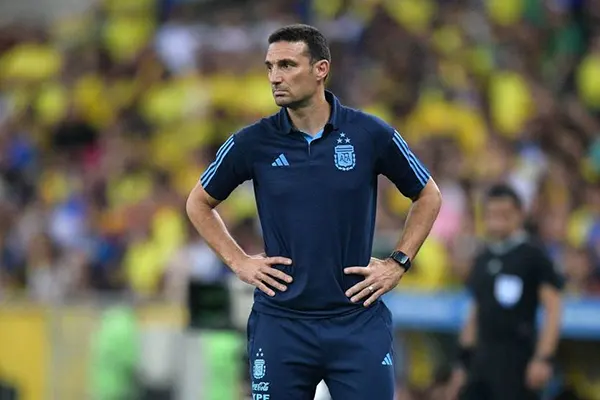Lionel Scaloni’s journey from a relatively unknown footballer to the mastermind behind Argentina’s 2022 World Cup triumph is a story of perseverance, strategy, and emotional intelligence. In a sport dominated by high-profile names, Scaloni quietly redefined what it means to lead a national team. As of February 2025, his leadership continues to influence global football, setting new benchmarks for success and humility in management.
Early Career and Transition to Coaching
Born in Pujato, Argentina, in 1978, Scaloni began his career as a player with Newell’s Old Boys before moving on to Estudiantes and then Deportivo La Coruña, where he won La Liga in 1999–2000. Although he had spells in Italy and England, his career as a player was steady rather than star-studded. What set him apart was his deep understanding of the game, even in his playing days, often noted by coaches and analysts alike.
After retirement, Scaloni quietly began his coaching career, starting as an assistant to Jorge Sampaoli in Sevilla and later for Argentina’s national team. Despite lacking major coaching experience, he was appointed interim coach after the 2018 World Cup—a decision met with scepticism in both local and international circles.
Yet it was this “outsider” status that became his strength. Free from the weight of expectations and ego, Scaloni approached his new role with pragmatism and openness, focusing on rebuilding the morale of a team that had been bruised by repeated failures in major tournaments.
Building a New Identity for Argentina
Scaloni’s first priority was to instil discipline and unity. He revamped the team’s composition, favouring younger, hungrier players and maintaining just enough veteran presence to guide them. Under his leadership, the team began to shed its reliance on individual brilliance, instead embracing collective effort and tactical balance.
He also helped shift the emotional dynamics of the squad. No longer burdened by Messi-dependency, Argentina began to function as a cohesive unit where each player knew his role. Scaloni’s quiet authority and emphasis on mental strength played a crucial role in fostering this transformation.
By the time Argentina lifted the Copa América trophy in 2021, the football world had begun to view Scaloni not as a placeholder, but as an architect of change. This victory ended a 28-year drought for the Albiceleste and served as the prelude to their World Cup campaign.
The 2022 World Cup: A Defining Moment
The Qatar 2022 World Cup was Lionel Scaloni’s crucible. Argentina started with a shock defeat against Saudi Arabia, leading to intense criticism. Yet Scaloni remained calm, adjusted tactics, and kept morale high. His decision-making proved crucial in subsequent matches, especially in knockout games against the Netherlands and Croatia.
In the final against France, Argentina delivered one of the most thrilling matches in World Cup history. Scaloni’s tactical set-up, balancing Messi’s freedom with defensive discipline, stood out as a masterclass in game management. His faith in young players like Enzo Fernández and Julián Álvarez paid off spectacularly.
Argentina’s triumph wasn’t just about Messi’s redemption—it was a validation of Scaloni’s vision. His humility during the celebrations, often stepping back to let the players shine, only reinforced his standing as a leader who serves the team above all.
The Psychology Behind His Leadership
Unlike many high-profile managers, Scaloni relies heavily on emotional intelligence. His ability to read the mood of the squad, make calm decisions under pressure, and communicate with clarity has made him a favourite among players. He fosters a familial atmosphere within the squad, where mutual respect and shared goals take precedence over individual fame.
This psychological resilience also extends to his tactical philosophy. Scaloni does not adhere rigidly to one system; instead, he adapts to the situation, opponent, and available personnel. This flexibility is a hallmark of modern coaching and has been key to Argentina’s recent consistency.
His methods reflect a modern approach to leadership—grounded in empathy, awareness, and strategic thinking. Scaloni’s rise proves that success in football management is no longer reserved for former superstars or media darlings; it belongs to those who understand people as well as the game.

Post-World Cup Legacy and Future Outlook
As of early 2025, Lionel Scaloni remains at the helm of Argentina’s national team. The federation extended his contract through to the 2026 World Cup, citing not only his sporting achievements but his transformative influence on team culture. Argentina currently sits among the favourites to win the Copa América 2024 and the next World Cup.
Scaloni is also becoming a reference point for younger coaches in Latin America. His career is studied in coaching courses, and his interviews are cited for their calm, measured tone. He continues to deflect attention from himself, often highlighting the contributions of his staff and players.
His legacy is not limited to trophies. Scaloni has shown that leadership in football can be reimagined—less about charisma and more about character. His story is a lesson in patience, self-belief, and the power of a unified vision.
What Lies Ahead for Scaloni?
With Copa América 2024 approaching and World Cup 2026 qualification underway, Scaloni faces the challenge of sustaining excellence. Argentina’s squad continues to evolve, and the pressure to maintain high standards grows with each passing year. Scaloni’s low-key style, however, has shown it can withstand scrutiny and success alike.
Several European clubs have reportedly expressed interest in hiring Scaloni, yet he remains committed to Argentina for now. His deep connection with the players and national pride seem to outweigh the lure of club-level prestige—at least for the foreseeable future.
Whatever the future holds, Lionel Scaloni’s name is now firmly etched in football history. From an uncelebrated right-back to a world champion coach, his story stands as one of the most compelling narratives in modern football management.
